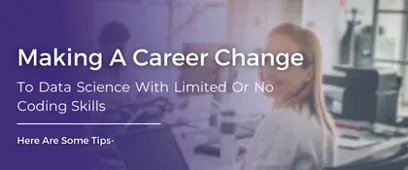Change Your Career to Data Science with Limited or No Coding Skills

Should you chuck your data science dream and instead pick a different one because you have no prior experience in coding? Believe us when we say a reassuring, emphatic ‘no’.
While there is no denying the fact that coding skills are essential in data science, this domain is more than just coding. Do not let your lack of coding experience keep you from becoming a data science professional.
If you want to make a career change to data science with limited or no coding skills, here are 6 tips to help you take the plunge:
1. Identify And Sharpen the Skills You Already Have
Although organizations would appreciate a data science professional who is good at programming, they tend to lean towards candidates who bring a diverse set of skills to the table. You might already have an impressive skill set - for instance, your statistical skills might be impeccable, your math might be on point, your analytical and visual skills could be unparalleled. That is, you are more desirable than a professional who specializes in programming. So while you learn to program, it is also advisable to perfect the skills that you already have in your arsenal.
2. Master GUI-based Tools
If you are not a huge fan of programming, there are several GUI (Graphical User Interface) data science tools at your disposal to make your life easier. From basic tools such as Microsoft Excel to complex ones like Tableau and Rattle, GUI-driven tools almost eliminate the need for programming in your projects; all you need to have instead is a sound knowledge of algorithms. These tools are easy to use and support the creation of quality machine learning models without programming.
3. Identify Your Niche
The programming languages you need depend on the data science job you want to do. If you are fascinated by procuring, storing, and managing data, you would want to master SQL. But if you are more drawn to analytics, visualization, and modeling, you need to learn Python or R language. They enable you to handle large data sets. You can also convert static visualizations into interactive ones using HTML and JavaScript.
{% module_block module "widget_f3316f80-3687-4d73-ae63-16d9a87095fc" %}{% module_attribute "child_css" is_json="true" %}{% raw %}{}{% endraw %}{% end_module_attribute %}{% module_attribute "css" is_json="true" %}{% raw %}{}{% endraw %}{% end_module_attribute %}{% module_attribute "definition_id" is_json="true" %}{% raw %}null{% endraw %}{% end_module_attribute %}{% module_attribute "field_types" is_json="true" %}{% raw %}{"image_desktop":"image","image_link":"link","image_mobile":"image"}{% endraw %}{% end_module_attribute %}{% module_attribute "image_desktop" is_json="true" %}{% raw %}{"alt":"Blog-Listing-Ad-Sep-05-2023-07-31-01-8380-AM","height":300,"loading":"lazy","max_height":300,"max_width":1200,"size_type":"auto","src":"https://odinschool-20029733.hs-sites.com/hubfs/Blog-Listing-Ad-Sep-05-2023-07-31-01-8380-AM.webp","width":1200}{% endraw %}{% end_module_attribute %}{% module_attribute "image_link" is_json="true" %}{% raw %}{"no_follow":false,"open_in_new_tab":true,"rel":"noopener","sponsored":false,"url":{"content_id":null,"href":"https://www.odinschool.com/datascience-bootcamp","type":"EXTERNAL"},"user_generated_content":false}{% endraw %}{% end_module_attribute %}{% module_attribute "image_mobile" is_json="true" %}{% raw %}{"alt":"Mobile-version-of-blog-ads-_5_-2","height":300,"loading":"lazy","max_height":300,"max_width":500,"size_type":"auto","src":"https://odinschool-20029733.hs-sites.com/hubfs/Mobile-version-of-blog-ads-_5_-2.webp","width":500}{% endraw %}{% end_module_attribute %}{% module_attribute "label" is_json="true" %}{% raw %}null{% endraw %}{% end_module_attribute %}{% module_attribute "module_id" is_json="true" %}{% raw %}132581904694{% endraw %}{% end_module_attribute %}{% module_attribute "path" is_json="true" %}{% raw %}"/OdinSchool_V3/modules/Blog/Blog Responsive Image"{% endraw %}{% end_module_attribute %}{% module_attribute "schema_version" is_json="true" %}{% raw %}2{% endraw %}{% end_module_attribute %}{% module_attribute "smart_objects" is_json="true" %}{% raw %}null{% endraw %}{% end_module_attribute %}{% module_attribute "smart_type" is_json="true" %}{% raw %}"NOT_SMART"{% endraw %}{% end_module_attribute %}{% module_attribute "tag" is_json="true" %}{% raw %}"module"{% endraw %}{% end_module_attribute %}{% module_attribute "type" is_json="true" %}{% raw %}"module"{% endraw %}{% end_module_attribute %}{% module_attribute "wrap_field_tag" is_json="true" %}{% raw %}"div"{% endraw %}{% end_module_attribute %}{% end_module_block %}
4. Connect With Professionals
Get in touch with experienced data science practitioners who can give you professional opinions on your skills, including programming. They can help you understand where you stand as a data science professional. Also discuss with them the trends in the industry, your earning potential with respect to your skills, work-life balance, and so on. If they end up liking your work, your network could even turn into potential referrals.
5. Start Working On Your Programming Skills
Now that you have decided to become a data science professional, it is imperative to develop basic programming skills. You can start with C, as it forms the foundation of several other programming languages.
Put your theoretical knowledge to the test by developing simple algorithms. Check out websites like CoderByte, TopCoder, and Project Euler; they conduct programming contests where you can assess your skills.
6. Join A Data Science Bootcamp
It is of paramount importance to start your career with proper guidance and training. This is where good data science bootcamps come in. These training programs deliver intensive industry-aligned training with up-to-date curricula that cover all the in-demand data science skills, including programming. They also come with hands-on, immersive learning experiences that help you hone your practical skills.
The idea of switching to data science might seem terrifying with limited coding experience. But our country is currently the second-largest hub for data science in the world. The number of data science jobs in India is steadily on the rise. You certainly want to make the most of the status quo.
All professional data science practitioners would agree that breaking into this field might be trying but absolutely worth it. So buckle up; if you work hard enough to set yourself apart, you can certainly become a successful data science professional. A professional Data Science Course can help you get there faster by exposing you to the most sought-after skills in the industry!